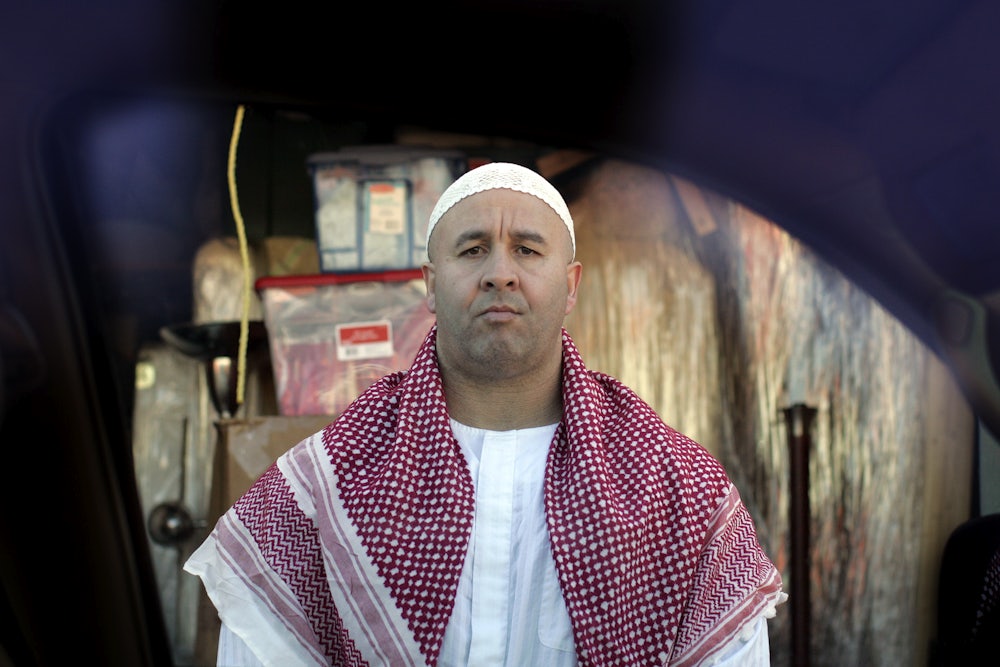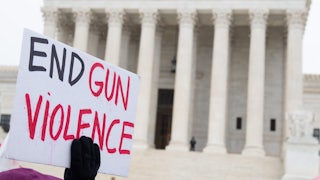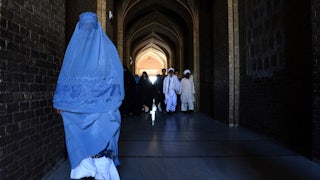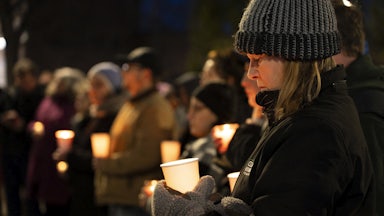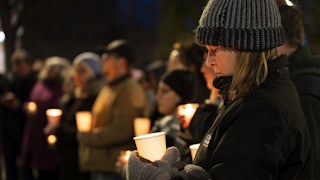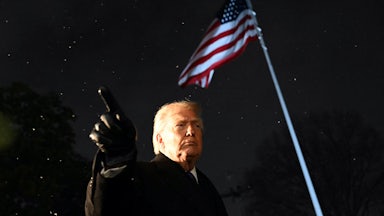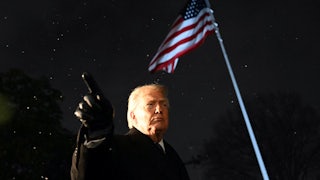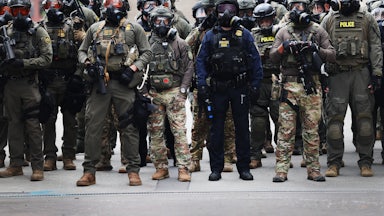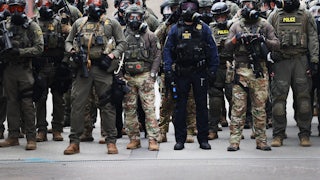Back in 2006, two FBI agents told a fitness instructor named Craig Monteilh to infiltrate Orange County’s Muslim community. Monteilh, who had been busted by the Drug Enforcement Administration in a drug investigation in 1986, had avoided prison by working as a confidential informant for various federal law enforcement agencies over the prior two decades. He posed as a Syrian French immigrant, adopted the name Farouk al-Aziz, and publicly converted to Islam to complete his fabricated identity.
But Monteilh’s work uncovered no terrorism plots or signs of potential extremism at the mosques, even when he started asking other Muslims about jihad and violence. Instead, Imam Yassir Fazaga and other community leaders tried to report Monteilh’s remarks to the FBI, only to be rebuffed by them. So they obtained a restraining order against Monteilh. But his relationship with the community took a twist in 2008, when he parted ways with the FBI and went public about his role in the FBI’s surveillance of Orange County Muslims. Fazaga then sued the FBI—with Monteilh’s help.
More than a decade later, that litigation, FBI v. Fazaga, has now reached the Supreme Court. The case highlights some of the most troubling practices of federal investigators during the height of the “war on terror” in the early 2000s—and the almost vertical uphill climb for those wronged by their actions to seek legal redress. In Monday’s oral arguments, the justices will be considering a complicated legal question about a surveillance law passed by Congress more than four decades ago, but in doing so they will effectively decide whether the Orange County Muslims will be able to hold the FBI accountable for this strange, overzealous, and allegedly discriminatory sting operation.
There appears to have been no specific justification for Monteilh to infiltrate Orange County’s Muslims in particular. “The explicit purpose of this operation was to gather information on Muslims in Orange County—not terrorists, spies, or even ordinary criminals, but Muslims,” the plaintiffs told the court in a response to the FBI’s review petition, quoting from Monteilh’s sworn statements. “The FBI did not identify specific targets for Monteilh, but ‘repeatedly made clear that they were interested simply in Muslims’ and ‘told him to gather as much information on as many people in the Muslim community as possible.’”
That involved countless personal interactions at gyms, mosques, and elsewhere between Monteilh and Orange County’s Muslims, yielding thousands of hours of surveillance recordings. “The FBI agents overseeing Monteilh gave him daily quotas for the number of Muslims he should get contact information from, told him to go to the gym with Muslims to get close to them and obtain information, and gave him a standing order to report on Muslims’ charitable giving, travel plans, and fundraising activities, as well as any lectures, classes, or any other events held at mosques,” they told the court.
Monteilh told The Guardian in 2012 that he was required to report any damaging information he gathered on Muslim targets, such as secret affairs or hidden sexual orientations, so the bureau could turn them into informants, as well. Information on non-Muslims was discarded, according to court filings. “None of the Plaintiffs were ever charged with or convicted of any crime,” the plaintiffs told the justices in their argument brief. “Nonetheless, the FBI spied on them, along with hundreds of other law-abiding Southern California residents, because of their faith.”
Fazaga and two mosquegoers who had multiple encounters with Monteilh, Ali Malik and Yasser Abdel-Rahim, sued the FBI in federal court in 2011 for violating their constitutional rights and engaging in religious discrimination. The Justice Department sought to dismiss the lawsuit by invoking the state secrets privilege, which allows the federal government to withhold evidence in legal proceedings that it believes would compromise national security. A federal district-court judge sided with the government in 2012 and dismissed the claims accordingly.
The Ninth Circuit Court of Appeals reversed the district court, however, and reinstated the plaintiffs’ claims against the FBI. The three-judge panel found that the lower court had erred by relying upon the state secrets doctrine to dismiss the charges instead of a provision in the Foreign Intelligence Surveillance Act, a federal law passed by Congress in the 1970s to reform foreign surveillance practices. FISA, the Ninth Circuit concluded, required the judge to hold a special type of secret hearing to review the state secrets evidence and potentially make it available in limited form to the plaintiffs.
Earlier this year, the Justice Department asked the Supreme Court to review and overturn the Ninth Circuit’s ruling. “The court of appeals’ decision has the startling consequence of transforming a limited provision of FISA that was designed to safeguard national-security information into a mechanism for overriding the Executive’s invocation of the state-secrets privilege and for adjudicating the merits of private-party claims for substantive relief on the basis of state secrets,” the Justice Department told the court in its filings.
Fazaga and the other plaintiffs told the Supreme Court that despite the government’s efforts to dismiss the religious-discrimination claims on state secrets grounds, the plaintiffs don’t actually need any state secrets to prove their case. “Only they possess the information they seek to keep secret, and Plaintiffs have not sought it to establish their entitlement to relief,” they told the court. “Defendants instead seek dismissal of Plaintiffs’ religion claims, based on their own need to use the information to defend themselves. But dismissal for that reason has no basis in the common-law state-secrets privilege or this Court’s precedent.” (Emphasis theirs.)
Though the justices will be focused on a procedural aspect of the state secrets privilege at Monday’s oral arguments, the case highlights the FBI’s troubling use—and perhaps its overuse—of confidential informants in counterterrorism sting operations against Muslim Americans. Critics have alleged that the bureau’s stings sometimes push defendants far closer to performing a terrorist attack than they otherwise would be. In some instances, The Intercept reported in 2013, those stings look less like the FBI is foiling plots already in progress and more like it is steering troubled individuals toward potential criminal activity, only to arrest them right before they do it.
Monteilh’s revelations, as well as the surveillance itself, had harmful consequences for the Muslim community in Southern California. In court filings, Fazaga said that the surveillance made him less confident that his counseling of worshippers would be private. Malik, who attended one of the targeted mosques as a teenager, recalled in a recent NPR interview how Monteilh’s talk of jihad—combined with his imposing physique and demeanor—had scared and intimidated him. Eventually, he said, he stopped attending the mosque altogether.
“That religious sanctuary, that spiritual sanctuary, became a place of complete discontent, complete chaos,” Malik said in the NPR interview. “It was a scary place. It was ruined. It was stained.” The Supreme Court, which has positioned itself as a champion of religious freedom in other cases, won’t decide whether the FBI engaged in religious discrimination in this case. But when thinking about how the government invokes the state secrets privilege to defeat lawsuits against it, the court might not be able to avoid thinking about how the FBI got here in the first place.
